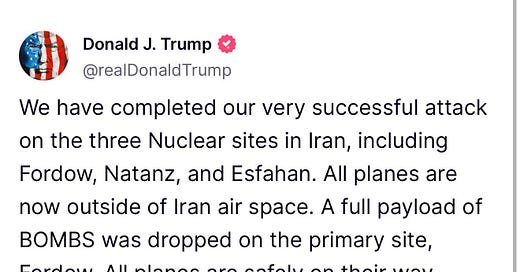Last night, former President Donald Trump ordered targeted airstrikes on Iran’s nuclear facilities, hitting key sites at Fordow, Natanz, and Esfahan using B-2 bombers and bunker-busting munitions. The operation followed Israeli action against Iran’s nuclear infrastructure, and Trump called the joint effort “very successful,” noting that all U.S. forces returned safely. For background, see The Times’ report on the strikes and TIME’s coverage.
While critics are already shouting about process, accusing Trump of bypassing Congress, here’s the truth: he didn’t need congressional approval for this strike, and he did the right thing.
The President’s Authority for This Mission
The U.S. Constitution gives Congress the power to declare war, but the president, as commander-in-chief, has always held the authority to direct short-term military operations to protect the nation and its interests. Last night’s strike was a textbook example: a limited, targeted use of force designed to eliminate a clear and present danger.
Under the War Powers Resolution, the president must notify Congress within 48 hours of introducing U.S. forces into hostilities. That’s been done. No prior approval is required for this kind of fast-moving military action. Trump acted within the scope of his authority, just as presidents before him have done, from Reagan to Obama.
Why This Strike Was Necessary
Let’s be clear about what’s at stake. Iran’s nuclear program is not some theoretical threat. The facilities targeted last night, including the heavily fortified site at Fordow, are critical components of Tehran’s push toward a nuclear weapon. Waiting for diplomacy or international agreements to stop Iran has repeatedly failed and left us closer to the day when the regime achieves its nuclear ambitions.
These strikes were necessary. They weren’t about adventurism or picking a fight. They were about preventing Iran from gaining the most dangerous weapon on earth. Frankly, acting decisively now likely prevents a far deadlier conflict down the road.
Congress’s Role (And When It’s Needed)
Congress absolutely has a constitutional role in deciding whether the U.S. should engage in sustained warfare. But last night wasn’t the start of a war. It was a targeted action to neutralize a growing threat. Under the War Powers framework, Trump now has 60 days before Congress must authorize further operations, should that become necessary.
If this evolves into prolonged engagement, Congress must act. But for now, the strike was lawful, measured, and, in my view, justified.
Final Thought
The president didn’t need Congress’s permission for this strike, and the strike itself was the right call. We cannot afford to sit idly by while Iran races toward nuclear capability. A limited, precise military action like this isn’t just legally sound, it’s strategically essential.




